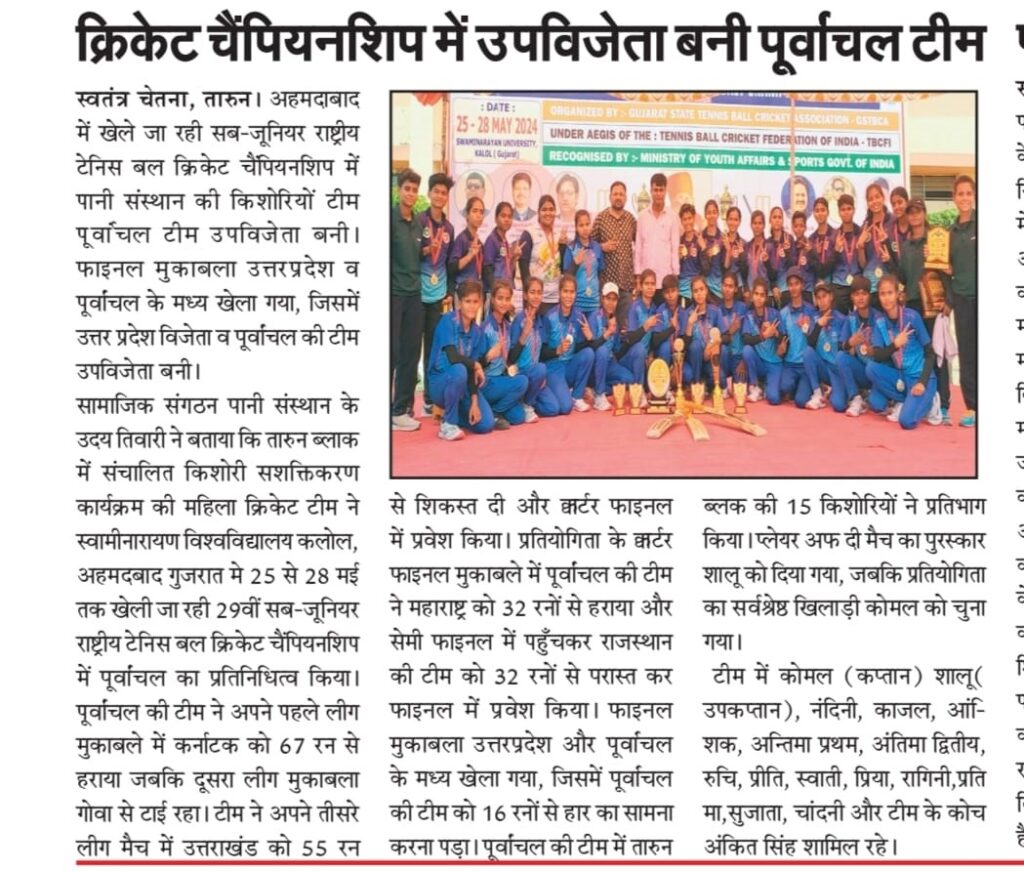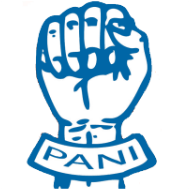PANI Newsletter Volume 01. No. 5, April- June2023
CHIEF FUNCTIONARY’S CORNER
Dear Readers,
Greetings from PANI!
I am pleased to present another exciting issue of our newsletter, this time, focusing on transformative agriculture and natural resource management in rural Uttar Pradesh. As India’s most populous state and a crucial agricultural center, Uttar Pradesh holds immense potential for sustainable development. However, it also faces significant challenges that require innovative solutions and collaborative efforts. As we navigate the challenges of sustainable development, we have discovered that the key to lasting change lies in empowering our youth and women.
PANI has long recognized the critical importance of transformative agriculture and effective natural resource management in rural areas. These approaches are not just about improving crop yields or conserving resources; they represent a fundamental shift in how we interact with our environment and sustain our communities.
Transformative agriculture goes beyond traditional farming methods. It embraces sustainable practices that enhance soil health, conserve water, and promote biodiversity while improving farmers’ livelihoods. By adopting such practices, we can address the dual challenges of food security and environmental preservation. Natural resource management is equally crucial. In a state where water scarcity, soil degradation, and deforestation are pressing issues, sustainable management of our natural resources is vital for long-term prosperity. Our initiatives aim to empower local communities to become stewards of their environment, ensuring that resources are used wisely and preserved for future generations.
The significance of these initiatives extends far beyond agriculture. PANI undertakes multiple initiatives for empowering youth and women, fostering economic independence, enhancing food security, and building more resilient communities. We’re seeing increased enrollment in educational/ professional courses, improved family health, and a growing sense of environmental responsibility.
Our approach is holistic, recognizing that agricultural transformation and resource management are interconnected with broader issues of rural development, gender equality, and climate resilience. We believe that by addressing these challenges comprehensively, we can create lasting positive change in rural Uttar Pradesh. In the following pages, you’ll find inspiring stories of youth and women and their journeys showcase the incredible potential that lies within our rural communities when given the right opportunities and support.
As we move forward, we remain committed to scaling up our efforts, reaching more communities, and deepening our impact. I invite you to read more about our vision and work in the following pages. We hope you find this newsletter informative and inspiring. It reflects the dedication of our team and partners, as well as the resilience of the communities we serve. We trust you’ll enjoy learning about the transformative potential of sustainable agriculture and resource management in shaping a brighter future for rural communities.
Thank you for your continued dedication to our mission. Enjoy the read!
Regards,
Bharat Bhushan
Chief Functionary
People’s Action for National Integration (PANI)
Recent Significant Developments
हर डगर हर नगर - Project activities
I. Empowering Gram Panchayats Bodies for Water-Centric Development
PANI is proud to share substantial progress in its efforts to empower rural communities through the Democratizing Water for Livelihood and Life Through Women (DWLL) project. Implemented across 30 Gram Panchayats in Mall Block, Lucknow, the project has successfully enhanced the capacity of local leaders to tackle critical water challenges and drive sustainable development.
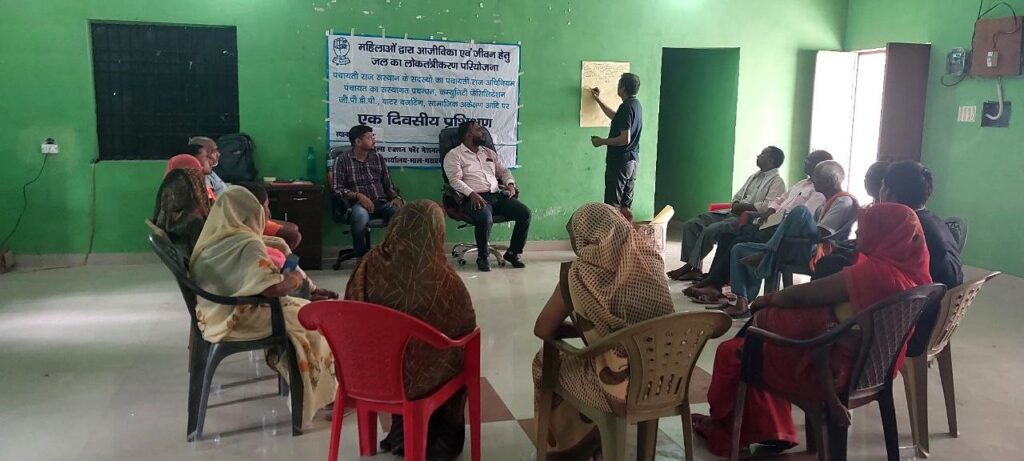 PANI conducted a series of comprehensive, full-day training sessions for Panchayati Raj Institution (PRI) members from June 18 to July 4, 2024. These sessions aimed to bolster the capacity of Gram Panchayats in Mall Block, to effectively address water-related challenges and reduce reliance on external government support.
PANI conducted a series of comprehensive, full-day training sessions for Panchayati Raj Institution (PRI) members from June 18 to July 4, 2024. These sessions aimed to bolster the capacity of Gram Panchayats in Mall Block, to effectively address water-related challenges and reduce reliance on external government support.
The training covered a wide range of topics, including:
- Strengthening Institutional Capacity: Enhancing understanding of the PRI Act, roles, and responsibilities within the Panchayat system.
- Developing Water Management Skills: Providing expertise in water budgeting, conservation practices, and GPDP formulation.
- Fostering Community Engagement: Building capacity for community participation, mobilization, and advocacy.
These interactive workshops brought together groups of 10-15 PRI members to discuss real-life challenges and explore practical solutions. The training proved highly successful, with an impressive 368 PRI members from 30 Gram Panchayats actively participating. Participants gained a deep understanding of their roles and responsibilities within the Panchayat system, empowering them to make informed decisions and drive positive change. Equipped with expertise in water management, planning, and conservation, these leaders are now better prepared to tackle pressing issues such as water scarcity and environmental degradation. Additionally, PRI members developed advocacy skills, enabling them to effectively communicate community needs to higher-level government officials and mobilize resources for sustainable development projects. This training program has empowered PRI members to execute their duties more effectively, ensuring sustainable development and improved governance at the Gram Panchayat level.
II. Empowering Farmers Through Government Safety Nets: PANI successfully concludes USAID PepsiCo GDA supported project
PANI is proud to announce the successful completion of its project aimed at enhancing the social and economic security of farmers associated with PepsiCo in Uttar Pradesh. In 2023 PANI joined hands with Resonance GDA supported by USAID and PepsiCo to provide smallholder farmers and farm laborers (targeting women laborers) working with PepsiCo suppliers with information about the benefits of major social and economic welfare schemes and provide basic digital literacy to women, young girls and laborers associated with PepsiCo suppliers directly or indirectly as family members of farmers.

On 22nd June 2024, PANI hosted a project closure workshop in Agra, Uttar Pradesh that brought together representatives from PepsiCo, Resonance, and PANI to evaluate the project’s impact and achievements. The collaboration between these organizations has been instrumental in creating a sustainable model for farmer empowerment. The project team overachieved the target of linking 600 farmers/ suppliers of PepsiCo to Government of India’s social and economic security schemes and linked 614 beneficiaries including farmers/ vendors, their family members and labourers across 7 districts – Agra, Aligarh, Bulandshahr, Etah, Hathras, Mathura, Ferozabad in Uttar Pradesh. The project team also trained over 80 young women among the families of farmers in basic digital and financial literacy.
PepsiCo and Resonance GDA has commended PANI team for its dedication and impact in the project, recognizing the positive changes brought about in the lives of farmers. Following this event, Mr. DeoDatt Singh, Head of Operations at PANI was invited at GDA’s India Summit held at Taj Centre in Gurugram on 11th July 2024 to recognise PANI’s commitment towards this project and bringing significant impact to the lives of farmers.
III. Groundnut Gold: A New Crop, Brighter Prospects
PANI Sansthan’s Climate Smart Agriculture and Livestock (CSAL-I) project is making significant strides in transforming agricultural practices in Balrampur district. One such initiative is the introduction of groundnut cultivation as a new crop for the Zaid season (April-June) in three blocks i.e Rehra Bazar, Balrampur & Tulsipur. By diversifying crop options, the project aims to address pressing challenges faced by farmers, including low income and land underutilization.
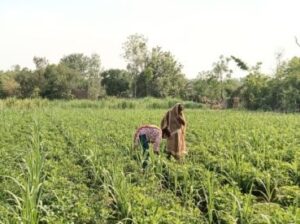 For many years the farmers in this region were not keen to grow groundnuts. Probable reasons that were identified for limited adoption of the groundnut cultivation were – limited access to quality seeds and inputs, fluctuations in groundnut prices, lack of reliable market linkages. fear of crop failure or low yields due to pests, diseases, or adverse weather conditions. By addressing these challenges through knowledge sharing, capacity building, and market linkages, the project has successfully encouraged farmers to adopt groundnut cultivation.
For many years the farmers in this region were not keen to grow groundnuts. Probable reasons that were identified for limited adoption of the groundnut cultivation were – limited access to quality seeds and inputs, fluctuations in groundnut prices, lack of reliable market linkages. fear of crop failure or low yields due to pests, diseases, or adverse weather conditions. By addressing these challenges through knowledge sharing, capacity building, and market linkages, the project has successfully encouraged farmers to adopt groundnut cultivation.
Through rigorous field trials with four groundnut varieties, the project identified TLG-45 as a high-yielding and suitable option for the region. Encouraging farmers to intercrop groundnuts with primary crops has proven to be a game-changer, providing an additional income stream without compromising on the primary crop.
As a legume, groundnuts possess the unique ability to capture nitrogen from the air and convert it into a form usable by plants. This natural process enriches the soil with nitrogen, reducing the need for chemical fertilizers and promoting sustainable agriculture. By incorporating groundnuts into their crop rotation, farmers can significantly improve soil health, increase organic matter content, and enhance soil structure. This leads to better water retention, reduced soil erosion, and improved overall soil fertility.
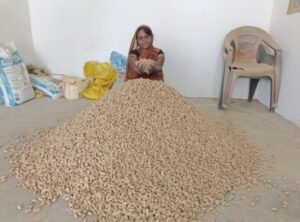 The groundnuts produced under the project were procured by the Rahra Mahila Farmer Producer Company (RMKFPC) providing net income of around INR 30-35,000 to farmers on production of groundnuts per acre of farm. This strategic move not only provides a stable market for farmers but also strengthens the local economy.
The groundnuts produced under the project were procured by the Rahra Mahila Farmer Producer Company (RMKFPC) providing net income of around INR 30-35,000 to farmers on production of groundnuts per acre of farm. This strategic move not only provides a stable market for farmers but also strengthens the local economy.
By creating a demand for groundnut produce, the project encourages more farmers to adopt this profitable crop. Additionally, the procurement of groundnuts by the FPC facilitates the expansion of groundnut cultivation areas, creating a sustainable value chain that benefits the entire community.
IV. PANI celebrated World Environment Day with Community Engagement
PANI marked World Environment Day on June 5, 2024 with a series of impactful events across four locations in Hardoi, under their Watershed Management Project. Bringing together approximately 400 community members, including local leaders, volunteers, and CSR representatives, the initiative aimed to foster environmental consciousness.


Through engaging activities and discussions, participants gained a deeper understanding of environmental challenges and explored sustainable solutions. The collective efforts of the community and organizations were instrumental in making the day a resounding success.
V. MacArthur Foundation’s team visits Siddharthnagar to witness Impact of Climate Resilience Project
 PANI was delighted to host MacArthur Foundation’s Country Head Ms. Yamini Mishra accompanied by Ms. Kavitha from grants office, for a 2-day visit to Uttar Pradesh from 8th-9th July 2024. The primary objective of the visit was to review the progress of the project funded by MacArthur Foundation – Building Climate Change Resilience through
PANI was delighted to host MacArthur Foundation’s Country Head Ms. Yamini Mishra accompanied by Ms. Kavitha from grants office, for a 2-day visit to Uttar Pradesh from 8th-9th July 2024. The primary objective of the visit was to review the progress of the project funded by MacArthur Foundation – Building Climate Change Resilience through
Entitlements (BCCRE) in Siddhargarhnagar, which aims to link citizens to the Government of India’s climate resilience schemes.
The visit provided a platform to showcase the progress of the project aimed at linking citizens to the Government of India’s climate resilience schemes.
During the visit, Ms. Yamini Mishra got the opportunity to engage with project beneficiaries, community leaders, and block-level government officials. The field visit encompassed various project sites, allowing for a comprehensive understanding of the project’s impact.
Key highlights of the visit included:
- Meeting with Head office Staff and Senior Management team at PANI: The visit commenced with a productive meeting at PANi’s head office in Ayodhya where macArthur team was engaged in detailed discussions with the senior management team. The meeting provided an opportunity to present a comprehensive overview of the project, including its goals, achievements, and challenges. Following the head office meeting, their team embarked on a field visit to Siddharthnagar.
- Beneficiary Meetings: Direct interactions with project beneficiaries in Siddharthnagar’s target block- Mithwal and Khesraha where they met community of Muslim women who got benefits under PM-Ujjawala Scheme through PANI, young men who got certified Entrepreneurship Training provided invaluable insights into the challenges faced by communities and the tangible benefits derived from the project.
- Field Site Inspections: On-ground assessments of project activities, such as solar installations, enabled Macarthur team to witness firsthand the project’s progress and its contribution to building climate resilience.
Macarthur Foundation’s team expressed their satisfaction with the project’s progress and commended PANI’s efforts in empowering communities to adapt to climate change. Their visit has further strengthened the partnership and will undoubtedly contribute to the project’s continued success.
VI. Empowering Adolescent Girls (EAG) Program: A Focus on Girls' Health
PANI’s Empowering Adolescent Girls (EAG) program in Khuniyaon development block, Siddharthnagar district, has expanded its focus to include the health of girls aged 10 to 19. In addition to nutrition, education, and rights, the program now emphasizes hemoglobin testing and dietary improvement.
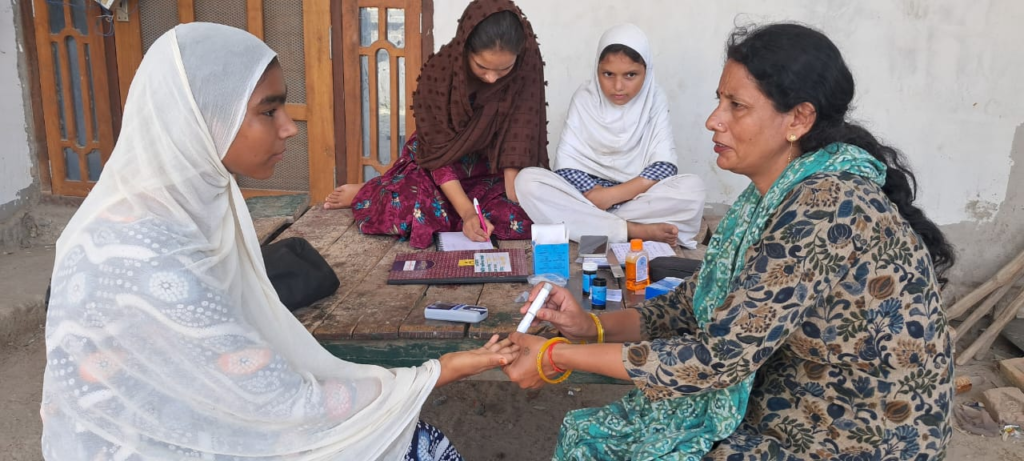
A comprehensive health assessment was conducted on 5,120 girls. Results indicated that 253 had normal hemoglobin levels, 669 had mild anemia, 3,703 had moderate anemia, and 495 had severe anemia. To address these health concerns, a plan was implemented to improve the nutrition of girls across all anemia categories, followed by subsequent hemoglobin tests.
The program provided 50,000 iron tablets to the girls and offered consistent dietary counseling. As a result of these efforts, hemoglobin levels increased by an average of 2 points in 1,117 girls who were retested. This positive outcome has encouraged girls to take ownership of their health by voluntarily undergoing blood tests and adopting healthier diets.
VII. Empowering Adolescent Girls (EAG) Program: Empowering Women Against Violence
Under EAG program, PANI hosted a transformative Violence Against Women (VAW) Training Program from 30th April-2nd May 2024 in Tarun block of Ambedkanagar, Uttar Pradesh. The session aimed at bringing together young female leaders to combat gender-based violence. Under this inititaive, a three-day training workshop was conducted with 29 Adoloscent Girls’ Leaders also known as Recource Centre Facilitators (RCFs) who run resource centers for Adoloscent girls in Tarun block,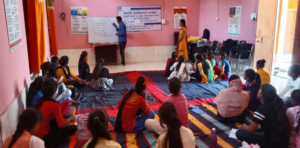 Ambedkarnagar, Uttar Pradesh. Training covered following key aspects:
Ambedkarnagar, Uttar Pradesh. Training covered following key aspects:
- Comprehensive Understanding: Participants explored various forms of violence against women, including physical, verbal, economic, and sexual abuse. This foundational knowledge provided a framework for in-depth discussions.
- Defining Gender-Based Violence (GBV): The training emphasized the global definition of GBV, highlighting its pervasive nature and profound impacts beyond physical harm.
- Domestic Violence Realities: Myths were dispelled, and complex family dynamics were examined, providing insights into the cyclical nature of abuse and strategies for intervention.
- Impact and Consequences: Attendees explored the far-reaching effects of gender-based violence, including emotional toll, diminished confidence, stress, and physical trauma.
- Addressing Root Causes: The training delved into systemic and cultural factors contributing to gender-based violence, emphasizing the need to empower voices and practice cultural sensitivity in advocacy efforts.
- Personal Testimonies: Participants shared their experiences, highlighting resilience and underscoring the importance of collective action. This training program equips young female leaders with the knowledge and skills to become powerful agents of change in their communities. By enhancing their ability to recognize, address, and prevent violence against women, these RCFs then further trained 325 adloscent girls from 7th-11th June 2024 across various locations in Tarun block.
VIII. Redefining Leadership: Our Journey Towards Positive Masculinity
From 8th May to 10th May, 2024, PANI took a significant step forward in our commitment to gender empowerment by hosting a groundbreaking three-day training workshop for Project Team Leaders. The focus was on Positive masculinity and its crucial role in creating a more equitable world. Recognizing that true gender empowerment requires the active participation and transformation of all genders, this workshop aimed to equip our team leaders with the knowledge and tools to become more effective champions for change.

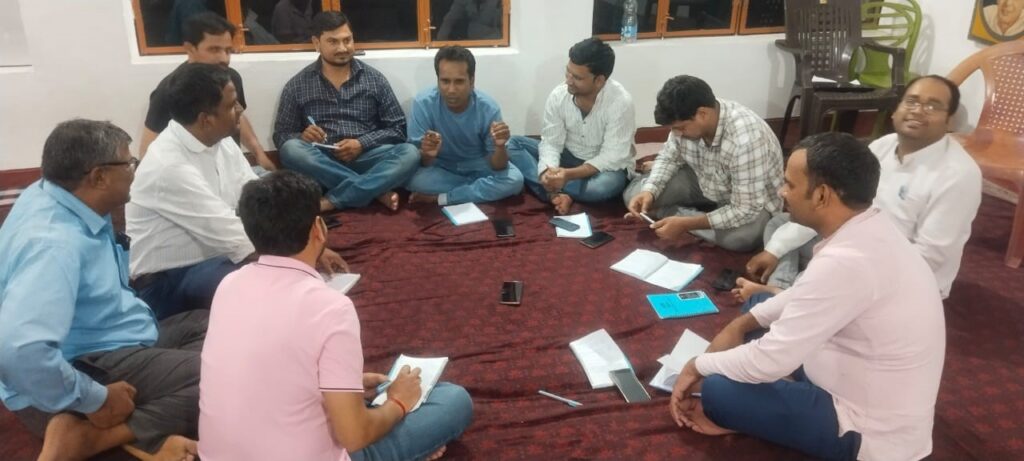
The training covered following key aspects:
- Understanding Gender Socialization and Individual Agency: The workshop kicked off with an exploration of gender socialization – the process by which individuals learn and internalize gender norms and expectations. Participants delved into how these societal constructs shape our behaviors, attitudes, and opportunities from an early age. Participants were encouraged to recognize their power to challenge and reshape gender norms in their personal and professional lives.
- Concept of “withdrawing power”: Focused on acknowledging and relinquishing the unearned privileges that come with gender, caste, and religion. Through group discussions, participants explored practical ways to create more inclusive environments in their projects and communities.
- Power Dynamics and Theories of Change: Partocipants delved into how power operates in society and the importance of changing power relations to achieve true gender equality. The participants discussed practical strategies for challenging and transforming power imbalances:
- Awareness: Recognizing hidden power dynamics in seemingly neutral situations.
- Language: Using inclusive language that doesn’t reinforce power imbalances.
- Decision-making: Ensuring diverse voices are heard and valued in decision-making processes.
- Resource Allocation: Examining how resources are distributed and who benefits.
- Theory of Reformation and Transformation. This framework provided our team leaders with a roadmap for implementing lasting change in their projects and communities.
IX. Post-Harvest Management Training for Women in Chitrakoot
 From 18th June to 30th June, 2024, PANI team organized post-harvest management training sessions for women heads of households in 25 Gram Panchayats (GPs) of Ramnagar block, Chitrakoot district, Uttar Pradesh. As part of its women-centric project on Advancing Food Security and Nutrition (AFSN), the initiative aimed to empower women to reduce post-harvest losses and improve household food security.
From 18th June to 30th June, 2024, PANI team organized post-harvest management training sessions for women heads of households in 25 Gram Panchayats (GPs) of Ramnagar block, Chitrakoot district, Uttar Pradesh. As part of its women-centric project on Advancing Food Security and Nutrition (AFSN), the initiative aimed to empower women to reduce post-harvest losses and improve household food security.
A total of 50 training batches were conducted, with each batch comprising 50 women. This reached over 2,500 households. During the sessions, trainers emphasized the connection between post-harvest management and food security and nutrition. Participants shared their traditional practices, which were then analyzed to highlight the advantages and disadvantages of different methods. The training focused on identifying causes of grain loss and promoting best practices to preserve both quantity and quality.
Participants expressed enthusiasm for the training, stating that the acquired knowledge will significantly benefit them in safeguarding their grain stocks throughout the year.
X. Laying the Foundation for a Brighter Future: PANI Launches "Buniyaad" ECCE Project in Balrampur
PANI has launched an exciting Early Childhood Care and Education (ECCE) project named as “Buniyaad” to transform early childhood education across 3 blocks of Balrampur District. The project, implemented with technical support from QUEST and funding from TATA TRUSTS, aims to create a holistic ecosystem for the healthy development of young children.
The “Buniyaad” project will cover an impressive 436 Anganwadi centers, 80 of which will be developed as model Anganwadi centers with ongoing support for the next 3 years. The project will also work closely with 60 co-located primary schools to ensure a smooth transition for children into formal schooling.
The key objectives of the project are:
- Establishing safe and stimulating learning environments in Anganwadis/Balvatikas for young children
- Enhancing the knowledge and skills of Anganwadi Workers, Helpers, and Supervisors, as well as primary school teachers
- Fostering gender-sensitive attitudes, beliefs, and skills among parents to support their children’s developmental needs at home
By achieving these objectives, the project hopes to drive lasting impact, including:
- Improved quality of preschool education in Anganwadi centers
- Enhanced school readiness among children
- Strengthened community engagement in early childhood education
- Increased gender sensitivity and equality in child-rearing practices
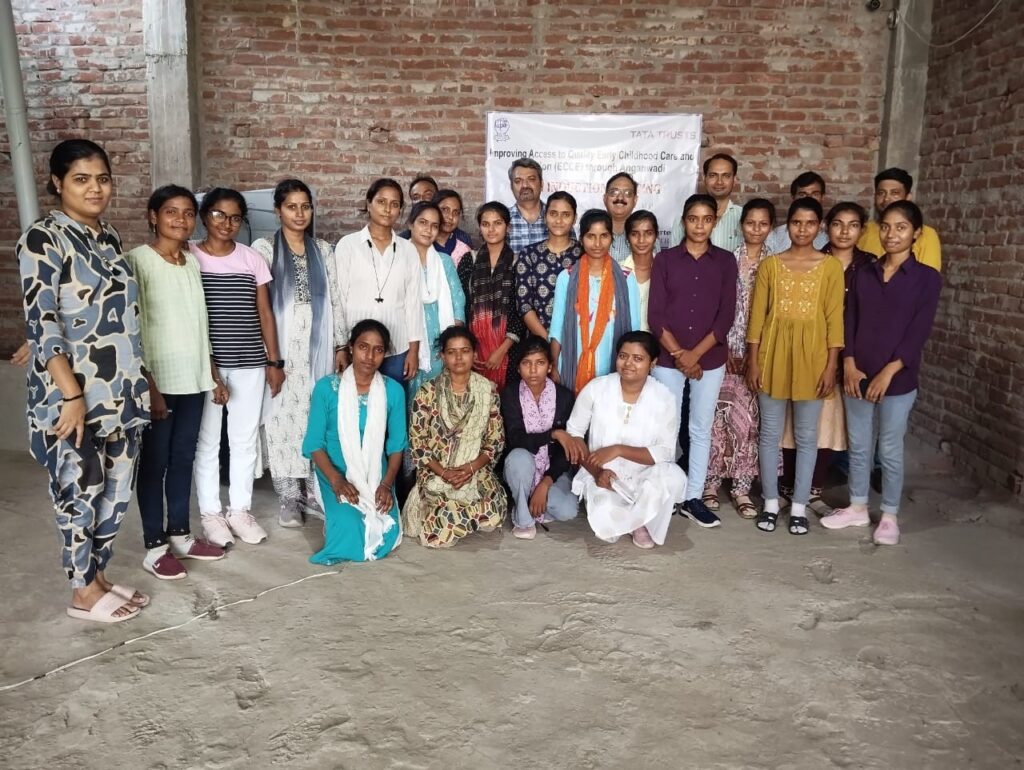 On June 20, 2024, the PANI team had the privilege of meeting with Mr. Vishwambhar, Education officer from TATA TRUST, to discuss the progress of the project. This meeting marked a significant milestone in the project, as it provided an invaluable opportunity to align our efforts with the esteemed insights and experiences of TATA TRUST.
On June 20, 2024, the PANI team had the privilege of meeting with Mr. Vishwambhar, Education officer from TATA TRUST, to discuss the progress of the project. This meeting marked a significant milestone in the project, as it provided an invaluable opportunity to align our efforts with the esteemed insights and experiences of TATA TRUST.
During the session, Mr. Vishwambhar, offered an in-depth briefing on the ECCE project, emphasizing the critical work being done to enhance early childhood education in the region. He particularly stressed the importance of gender sensitivity, underscoring the need to create an inclusive environment that supports the development of all children, regardless of gender. His insights were truly invaluable, shedding light on best practices and strategies to ensure our project not only meets but exceeds its objectives.
Took the time to motivate our dedicated team, recognizing the hard work and commitment that each member brings to the project. His words were deeply inspiring, reinforcing our shared mission to make a tangible difference in the lives of young children in Balrampur.
The meeting concluded on a high note, with a renewed sense of purpose and enthusiasm among the team members. Empowered by the valuable lessons learned, we are now more determined than ever to implement the project’s strategies and create a transformative impact on early childhood education in the region.
This collaboration with TATA TRUST has further strengthened our resolve to build a solid foundation for the holistic development of young children in Balrampur. Together, we are committed to ensuring that every child has access to a safe, stimulating, and inclusive learning environment, paving the way for a brighter future.
सफलता के नए आयाम - Success Stories
I. Raised Beds, Rising Hopes: Success Story from Bohali
Manravati Devi, a resilient farmer from Bohali Gram Panchayat, together with her husband, Kuldeep, cultivates two acres of land, their primary source of income to support their family and children’s education. Bohali Gram Panchayat, located in Barhani block of Uttar Pradesh, is a typical rural community primarily dependent on agriculture. The main crops cultivated here are wheat, mustard, and onion during the winter season (Rabi), and rice during the monsoon season (Kharif). Most farmers in Bohali own small landholdings and rely on traditional farming methods. While these methods have sustained livelihoods for generations, they often result in low yields and high costs. To make matters worse, the region’s vulnerability to flooding further challenges farmers’ ability to thrive.
Manravati Devi and her husband, like many others in Bohali, faced the harsh realities of these agricultural constraints. Their limited income from farming barely sufficed to meet their family’s basic needs, making it difficult to invest in their children’s education or improve their living conditions.
PANI has been executing SARAL initiative introducing transformative agricultural practices in the 3 blocks of Siddharth Nagar district (Bansi, Barhani, and Itwa) Uttar Pradesh. This program is designed to reduce inputs cost, enhance crop productivity, and double farmers’ incomes while focusing on water conservation strategies. The SARAL project introduced a ray of hope into Manravati’s life when she met Nandani Devi, a Community Resource Person (CRP) under SARAL project. PANI team obserrved that the current traditional methods used for onion cultivation by the villagers result in suboptimal yields. By adopting advanced techniques, such as the raised bed method for onion cultivation, farmers can significantly enhance their productivity. project introduced a ray of hope into Manravati’s life when she met Nandani Devi, a Community Resource Person (CRP) under SARAL project. PANI team obserrved that the current traditional methods used for onion cultivation by the villagers result in suboptimal yields. By adopting advanced techniques, such as the raised bed method for onion cultivation, farmers can significantly enhance their productivity.
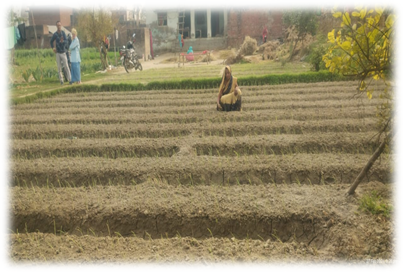
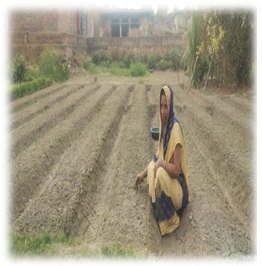
The team of experts at PANI, introduced Manravati to a high-yielding, early-maturing onion variety suitable for the local climate. They guided her on preparing well-drained raised beds and optimizing seed spacing. To ensure healthy growth, they recommended a balanced fertilizer application schedule and efficient irrigation practices.The team also emphasized the benefits of mechanized sowing for pulses and cereals to reduce costs and improve efficiency. Additionally, the “Machan” method for intercropping vegetables was introduced, showcasing the potential to maximize land use and diversify income.
By switching to this innovative method, Manravati’s family experienced a substantial rise in income. Their financial stability improved. The technical farming method, demonstrated enhanced efficiency, lowering cultivation costs by Rs. 112 (4.9% reduction), increasing yield by 1.5 quintals (19.25% increase), boosting gross income by Rs. 2,996 (19.22% increase) and improving net profit by Rs. 3,108 (23.36% increase) compared to traditional farming methods.
Manravati Devi’s success story has become a beacon of inspiration for farmers in Bohali Gram Panchayat and beyond. Her proactive adoption of advanced farming techniques, particularly in enhancing onion cultivation, has demonstrated the tangible benefits of modern agricultural practices. By sharing her experiences and achievements, Manravati has inspired fellow farmers to reconsider traditional methods and embrace innovative approaches advocated by SARAL project team.
II. Breaking Barriers: Rural UP Girls Shine in Junior Cricket Championship
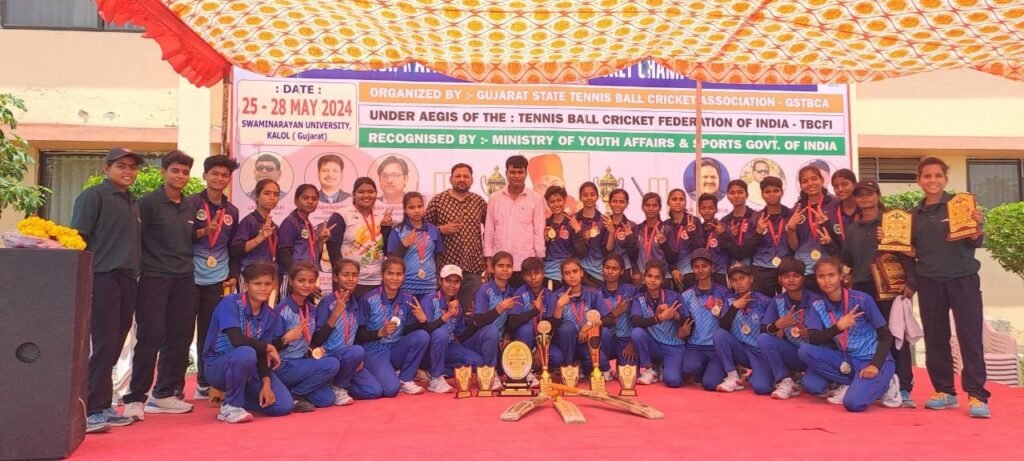 In a remarkable triumph for gender equality and youth empowerment, a group of 15 adolescent girls from Tarun Block in rural Uttar Pradesh has made headlines by securing the Runner-up trophy in the Junior Tennis Ball Cricket Championship held from 25th-28th May 2024 in Ahmedabad, Gujarat. This achievement, facilitated by PANI, under Empowering Adolescent Girls (EAG) program marks a significant milestone in breaking social barriers and challenging gender norms in one of India’s most conservative regions.
In a remarkable triumph for gender equality and youth empowerment, a group of 15 adolescent girls from Tarun Block in rural Uttar Pradesh has made headlines by securing the Runner-up trophy in the Junior Tennis Ball Cricket Championship held from 25th-28th May 2024 in Ahmedabad, Gujarat. This achievement, facilitated by PANI, under Empowering Adolescent Girls (EAG) program marks a significant milestone in breaking social barriers and challenging gender norms in one of India’s most conservative regions.
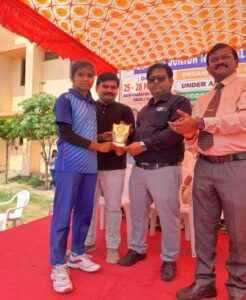 When PANI team first proposed the idea of training girls for cricket in Tarun Block, it was met with skepticism. However, through persistent community engagement, we convinced 15 families to allow their daughters to participate in what was traditionally considered a “boys’ sport.” These 15 young athletes traveled to Ahmedabad, Gujarat, to compete in the Junior Tennis Ball Cricket Championship. For many, it was their first time leaving their village, let alone their state.
When PANI team first proposed the idea of training girls for cricket in Tarun Block, it was met with skepticism. However, through persistent community engagement, we convinced 15 families to allow their daughters to participate in what was traditionally considered a “boys’ sport.” These 15 young athletes traveled to Ahmedabad, Gujarat, to compete in the Junior Tennis Ball Cricket Championship. For many, it was their first time leaving their village, let alone their state.
The team’s performance throughout the tournament was nothing short of inspirational. They showcased not just their cricketing skills but also their teamwork, strategy, and sportsmanship. In a display of exceptional talent and determination, our girls triumphed over teams from Karnataka, Goa, Uttarakhand, Maharashtra, and Rajasthan.
While the team narrowly missed the championship title, securing the Runner-up position was a monumental achievement. The girls returned to Tarun Block as heroes, their success challenging long-held beliefs about gender roles and capabilities.
III. From Seeding Sweat to Super Success: Yogendra’s Journey with the Subsidized Super Seeder
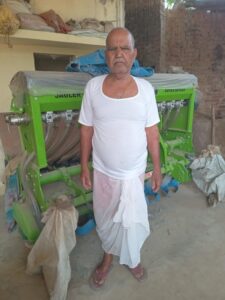 Yogendra kumar Dubey, a small farmer in Gram Panchayat Pala, Khesraha block of Siddharthnagar district in Uttar Pradesh, used to grow paddy and wheat in rotation on 3 acres of land. Every year, he faced the arduous task of preparing his fields for the paddy sowing season after harvesting the wheat crop. Like most farmers in his region, Yogendra relied on the traditional method of burning the leftover wheat stubble to clear his fields. This practice not only caused severe air pollution but also degraded the soil quality over time. Additionally, he had to hire labor at exorbitant rates to manually remove the stubble, which was a backbreaking and time-consuming process. The backbreaking labor of scattering seeds by hand, battling the scorching sun and unpredictable weather, left him exhausted and yearning for a better way. Limited resources and the high cost of labor further squeezed his meager profits.One day Yogendra met one of the representatives from PANI promoting farm mechanization under PANI’s Building Climate Change Resilience through Entitlements (BCCRE) project in Siddharthnagar. He attended one of their demonstration sessions where they staged super seeder in one of the farm plots. These innovative machines promised to revolutionize wheat sowing, offering efficiency and a glimmer of relief for weary farmers like Yogendra.
Yogendra kumar Dubey, a small farmer in Gram Panchayat Pala, Khesraha block of Siddharthnagar district in Uttar Pradesh, used to grow paddy and wheat in rotation on 3 acres of land. Every year, he faced the arduous task of preparing his fields for the paddy sowing season after harvesting the wheat crop. Like most farmers in his region, Yogendra relied on the traditional method of burning the leftover wheat stubble to clear his fields. This practice not only caused severe air pollution but also degraded the soil quality over time. Additionally, he had to hire labor at exorbitant rates to manually remove the stubble, which was a backbreaking and time-consuming process. The backbreaking labor of scattering seeds by hand, battling the scorching sun and unpredictable weather, left him exhausted and yearning for a better way. Limited resources and the high cost of labor further squeezed his meager profits.One day Yogendra met one of the representatives from PANI promoting farm mechanization under PANI’s Building Climate Change Resilience through Entitlements (BCCRE) project in Siddharthnagar. He attended one of their demonstration sessions where they staged super seeder in one of the farm plots. These innovative machines promised to revolutionize wheat sowing, offering efficiency and a glimmer of relief for weary farmers like Yogendra.
The Super Seeder is an advanced agricultural machine that combines soil preparation, seeding, fertilizing, and pressing into a single-pass solution. It is designed to make cultivation, mulching, sowing, and fertilizer spreading possible in one operation. Witnessing the Super Seeder effortlessly sow seeds in perfect rows, with minimal soil disturbance and precise seed depth, ignited a spark of curiosity in Yogendra. He further enquired the details from PANI representative and got to know of government’s subsidy program for super seeders. Under Agricultural Mechanization for In-Situ Management of Crop Residue program, financial assistance @ 50% of the cost of machinery is provided to the farmers for purchase of crop residue management machinery.
With newfound determination, Yogendra applied for the subsidy and, upon approval, proudly brought the Super Seeder to his farm. The initial days were filled with a nervous excitement. Learning to operate the Super Seeder required some practice, but with the help of patient PANI representatives, Yogendra mastered the controls. Yogendra finished sowing his fields in a fraction of the time it used to take, leaving him with newfound energy. More importantly, the even seed distribution and proper depth control led to a noticeable improvement in germination.
Results:
- Reduced Input cost: The Super Seeder eliminated the need for a large workforce, freeing Yogendra from the physical strain of manual sowing. His input costs decreased by 30% due to reduced labor, fertilizer, and pesticide requirements.
- Increased Efficiency: The machine could sow vast fields in a fraction of the time, potentially allowing Yogendra to manage more land or dedicate saved time to his health & family.
- Improved Yields: The Super Seeder’s precise seeding ensured uniform germination and potentially led to higher crop yields increasing it by 20% from last cycle, boosting Yogendra’s income.
- Improved soil health: The Super Seeder’s minimal soil disturbance minimized erosion and helped retain moisture, is expected to contributing to long-term soil health.
- Environmentally friendly Super seeder eliminated the need of stubble burning thus contributes to reduce pollution caused after each crop cycle. Further, he retained the nutrients in the soil, reducing his need for extra fertilizers.
- Yogendra’s success story became an inspiration for other farmers in his village. Witnessing his efficiency and the potential for increased yields, they too began to consider the Super Seeder. Yogendra now actively shares his experiences with other farmers, encouraging them to adopt modern technologies to increase their productivity and income while protecting the environment
PANI in Media

